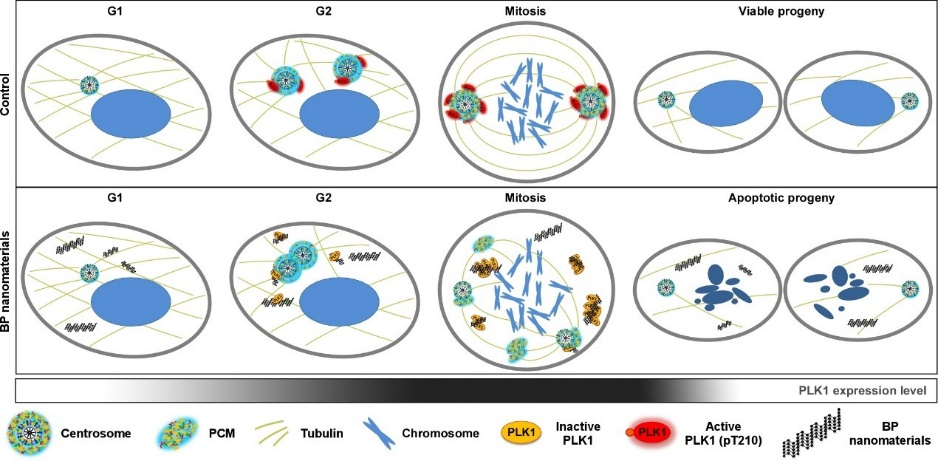Targeting Mitosis as Novel Anticancer Mechanism for Nanomaterials
Date:07-08-2021 | 【Print】 【close】
Recently, a research group led by Prof. LI Hongchang from the Shenzhen Institute of Advanced Technology (SIAT) of the Chinese Academy of Sciences has identified a novel anticancer property of black phosphorus (BP) nanomaterials with a detailed mitosis-targeting mechanism. Relevant research results have been published online in Nature Nanotechnology on Aug 5.
Although nanomaterials have shown great promise in cancer therapy, whether a certain nanomaterial can target a specific organelle or even a specific biomolecule to elicit a specific cellular effect as in the case of many commonly used small molecular drugs remains largely unknown, which prevent their inclusion into mainstream clinical applications.
In this study, using BP nanomaterials, the researchers discovered a novel nano-biological effect where nanomaterials directly affect the core of all mitotic life, the cell cycle’s centrosome machinery and consequently present anticancer promise. At the molecular level, they further identified the mitotic kinase PLK1 as a specific target of BP nanomaterials in cell cycle progression.
Based on this study, they propose that every kind of nanomaterial would have some specific interactions with some machinery within the cell, which means that nanomaterials can be applied for real nanomedicine development with their intrinsic nano-bio properties. This is counter to the common assumption of nanomaterials as being passive drug carriers where their roles are completed once they enter the cells and the drug load is dispensed.
From the perspective on safety concerns, the implications of this study are even beyond nanomedicine as nanomaterials that are in vastly different domains of nanotechnology like batteries or nano-electronics have the potential of entering into the environment as waste and thereby affecting biotic ecosystems. So, understanding the nano-bio interaction can also provide new opportunities for improving safer and more efficacious nanotechnology.
This work was supported by the National Natural Science Foundation of China, Guangdong Provincial Natural Science Foundation, and Shenzhen Science and Technology Program.

A model to illustrate the molecular anticancer activity of BP nanomaterials through blocking mitotic progression (Image by SIAT).
Media Contact:
SUN Lujia
Email: lj.sun@siat.ac.cn
Download the attachment: